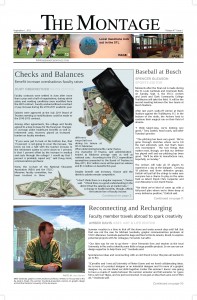Benefit increase overshadows faculty raises

Kurt Oberreither
-News Editor-
Faculty contracts were settled in June after more than a year and a half of negotiations, during which salary and working conditions were modified from the 2007 contract. Faculty worked without a contract or pay increase during the 2010-2011 academic year.
Salaries were approved at the July 2011 Board of Trustees meeting so modifications could be made to the 2010-2013 contract.
Among other agreements, the college and faculty agreed to a step increase for the fiscal year. Changes in coverage under healthcare benefits as well as retirement costs, however, placed an increased burden on faculty members.
“If you were just to look at the bottom line, that 1.5 percent is not going to cover the increase. We know we lost a half with the teacher increase in the retirement system so we’re down to 1 percent. Is that 1 percent offset by the increase in medical and costs through the college? I would say that 1 percent is probably wiped out,” said Doug Hurst, communications professor.
Hurst, the co-chair of the National Educators Association (NEA) and the STLCC-Meramec faculty committee, has been involved in three different negotiations during his tenure at STLCC-Meramec.
When determining benefits, Carla Chance, vice chancellor of finance, said administration looked at Midwest average costs as well as national costs. According to the STLCC expenditure assumptions presented to the Board of Trustees in May 2011, $0.2 million more will be spent on salaries and $1.4 million on benefits this year.
Despite benefit cost increases, Chance said the district’s salaries remain competitive.
“I don’t think there is a singular response,” Chance said. “I think there is a good understanding in the district that the salaries are at market rate.”
A change in health benefits, though, affects the bottom line of faculty income.
In spring of 2011, Chancellor Zelema Harris disbanded the employee benefits committee after approving the United Healthcare renewal cost the committee disapproved of. The plan became effective in June.
Following the removal of the benefits committee, the American Federation of Teachers (AFT) filed three grievances with the college.
According to Roy Shaneberger, human resource specialist for the district, Harris decided to disband the committee in order for the college to be “more proactive.”
“There was a feeling that we needed to expand,” Shaneberger said. “We wanted to look at healthcare reform and prepare.”
The new plan saw an increase of employee premiums from $49.34 to $56 for the base plan. Co-pays also increased up to $25 on the premier plan and deductibles doubled. Prescription costs also increased.
“That option shifted a substantial amount of cost from the college to the employees,” said Margaret Hvatum, Information Systems faculty and a member of the benefits committee. “We presented that clearly to HR and they knew that the entire benefits committee did not like that third option and had voted against it.”
According to Hurst, another disagreement within the proposed contract was that administration wanted to cap the amount of overload a full-time faculty member could teach. Hurst said he thought it was important that faculty have control over how many hours they teach at the colleges.
“The administration, ever since I’ve been involved, has always tried to cut into teaching loads: overload and summer. If you restrict what the faculty members can teach in the summer and overload, that means you have to hire more adjunct and part time people,” Hurst said. “And we know that at St. Louis Community College they’re well trained and we’re comfortable with that. However, our best employees are full time. We’re the ones on the front line; we make St Louis Community College.”
The faculty maintained a maximum of 18 hours for fall/spring overload and summer overload. Administration argued that even though there were hours to fill, too much overload teaching could affect the level of quality.
“Faculty members asked how does no overload affect me? In this economic climate that we live in—and I only got a 1.5 percent raise, cost of living is going up and I pay more into retirement, my health benefits are going up. How am I going to make extra money? I’m going to teach overload; I’m going to teach an extra class in the summer,” Hurst said. “I’m not saying that we should encourage people to teach overload when there are problems. Let’s deal with those problems through the evaluation process. But having blanket rules that say you can only teach so much is not in the best interest of the district.”
Hurst said ultimately, the changes should benefit not only faculty, but students and the entire district.
“I am happy to still have a job,” Hvatum said. “It could definitely be worse.”











